HI6026 Audit, Assurance: Auditor's Public Interest Responsibilities
VerifiedAdded on 2023/04/23
|18
|4607
|494
Report
AI Summary
This report provides a comprehensive analysis of an auditor's public interest responsibilities and audit quality, focusing on Orica Limited as a case study. It examines stakeholder analysis, highlighting the potential impact of material misstatements on various groups, including suppliers, government, customers, staff, shareholders, and investors. The report further explores the concepts of audit independence and whistleblowing, emphasizing their importance in maintaining ethical standards and preventing unethical practices, referencing APES 110. The lessons learned from the Enron scandal, particularly the role of Arthur Andersen, are discussed to underscore the importance of auditor integrity and the need for improved accounting standards and corporate governance. Finally, the report addresses audit quality in light of warnings from Greg Medcraft, emphasizing the need for robust safeguards and adherence to auditing principles.
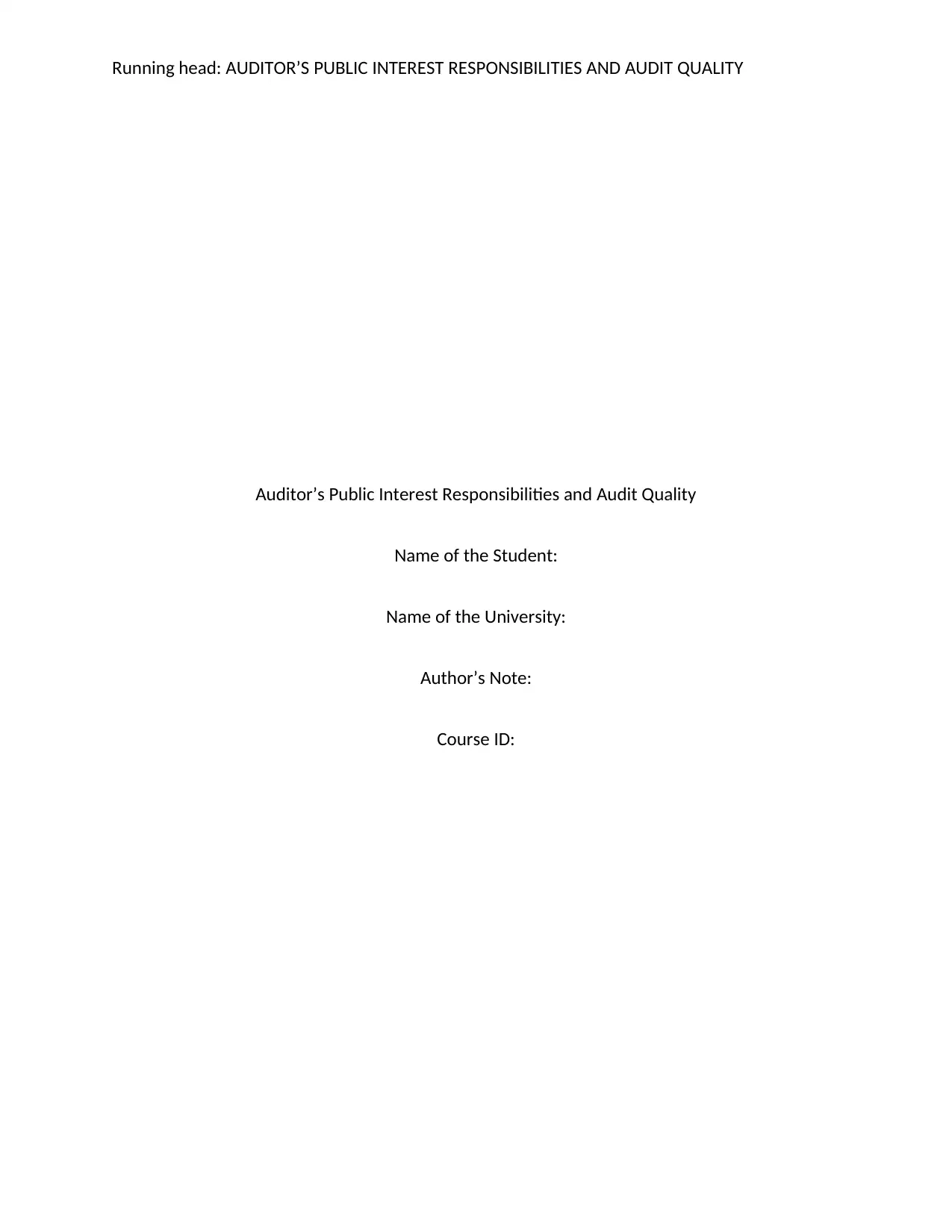
Running head: AUDITOR’S PUBLIC INTEREST RESPONSIBILITIES AND AUDIT QUALITY
Auditor’s Public Interest Responsibilities and Audit Quality
Name of the Student:
Name of the University:
Author’s Note:
Course ID:
Auditor’s Public Interest Responsibilities and Audit Quality
Name of the Student:
Name of the University:
Author’s Note:
Course ID:
Paraphrase This Document
Need a fresh take? Get an instant paraphrase of this document with our AI Paraphraser
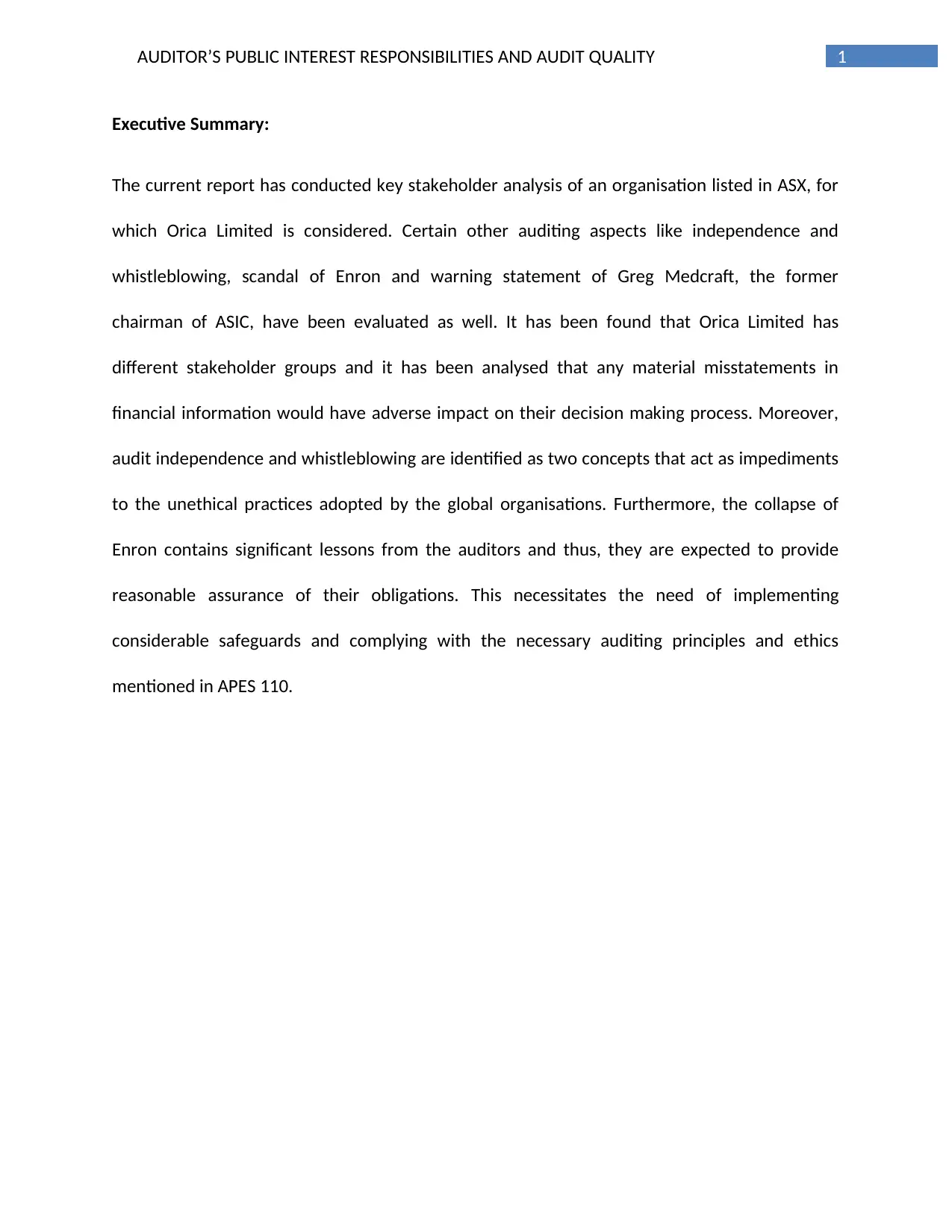
1AUDITOR’S PUBLIC INTEREST RESPONSIBILITIES AND AUDIT QUALITY
Executive Summary:
The current report has conducted key stakeholder analysis of an organisation listed in ASX, for
which Orica Limited is considered. Certain other auditing aspects like independence and
whistleblowing, scandal of Enron and warning statement of Greg Medcraft, the former
chairman of ASIC, have been evaluated as well. It has been found that Orica Limited has
different stakeholder groups and it has been analysed that any material misstatements in
financial information would have adverse impact on their decision making process. Moreover,
audit independence and whistleblowing are identified as two concepts that act as impediments
to the unethical practices adopted by the global organisations. Furthermore, the collapse of
Enron contains significant lessons from the auditors and thus, they are expected to provide
reasonable assurance of their obligations. This necessitates the need of implementing
considerable safeguards and complying with the necessary auditing principles and ethics
mentioned in APES 110.
Executive Summary:
The current report has conducted key stakeholder analysis of an organisation listed in ASX, for
which Orica Limited is considered. Certain other auditing aspects like independence and
whistleblowing, scandal of Enron and warning statement of Greg Medcraft, the former
chairman of ASIC, have been evaluated as well. It has been found that Orica Limited has
different stakeholder groups and it has been analysed that any material misstatements in
financial information would have adverse impact on their decision making process. Moreover,
audit independence and whistleblowing are identified as two concepts that act as impediments
to the unethical practices adopted by the global organisations. Furthermore, the collapse of
Enron contains significant lessons from the auditors and thus, they are expected to provide
reasonable assurance of their obligations. This necessitates the need of implementing
considerable safeguards and complying with the necessary auditing principles and ethics
mentioned in APES 110.
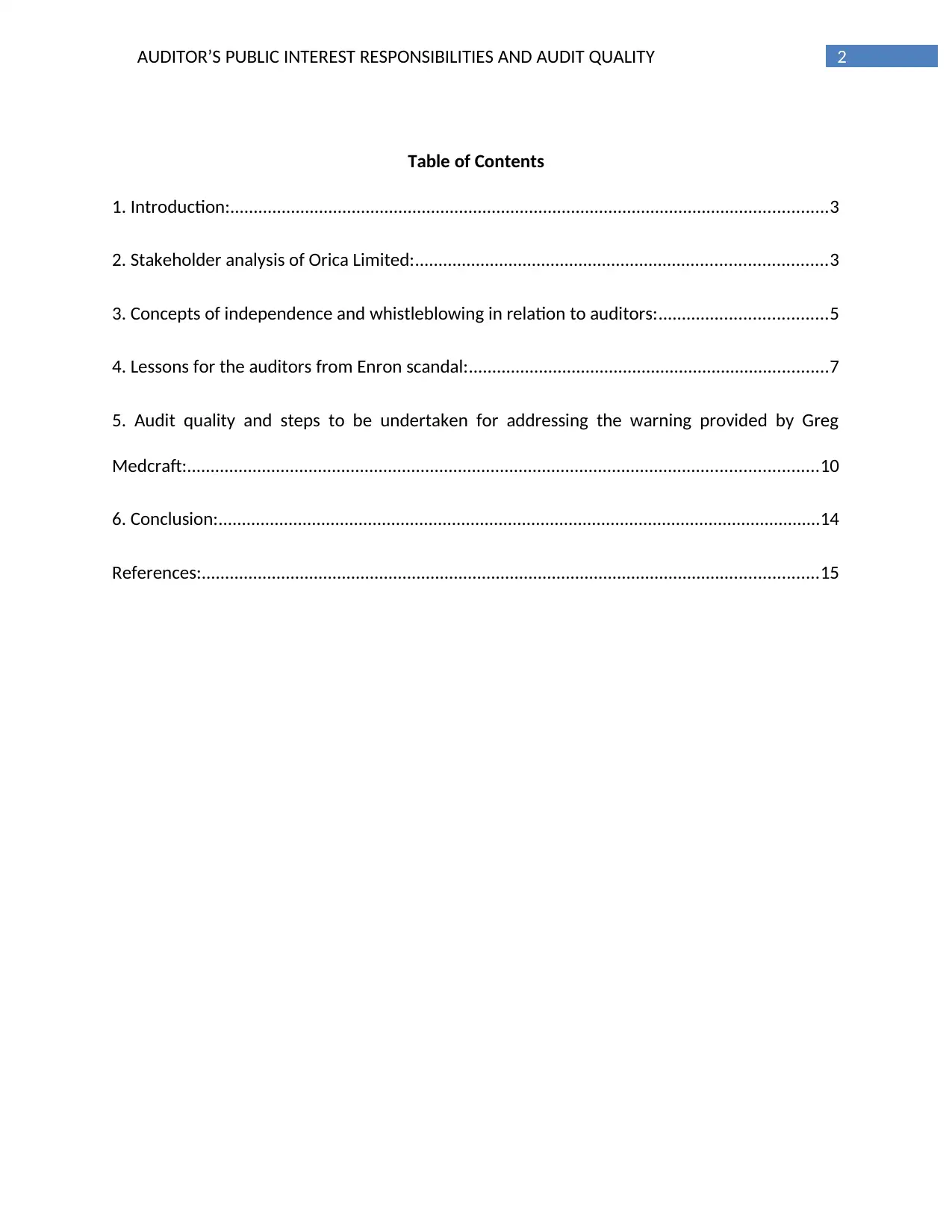
2AUDITOR’S PUBLIC INTEREST RESPONSIBILITIES AND AUDIT QUALITY
Table of Contents
1. Introduction:................................................................................................................................3
2. Stakeholder analysis of Orica Limited:........................................................................................3
3. Concepts of independence and whistleblowing in relation to auditors:....................................5
4. Lessons for the auditors from Enron scandal:.............................................................................7
5. Audit quality and steps to be undertaken for addressing the warning provided by Greg
Medcraft:.......................................................................................................................................10
6. Conclusion:.................................................................................................................................14
References:....................................................................................................................................15
Table of Contents
1. Introduction:................................................................................................................................3
2. Stakeholder analysis of Orica Limited:........................................................................................3
3. Concepts of independence and whistleblowing in relation to auditors:....................................5
4. Lessons for the auditors from Enron scandal:.............................................................................7
5. Audit quality and steps to be undertaken for addressing the warning provided by Greg
Medcraft:.......................................................................................................................................10
6. Conclusion:.................................................................................................................................14
References:....................................................................................................................................15
⊘ This is a preview!⊘
Do you want full access?
Subscribe today to unlock all pages.

Trusted by 1+ million students worldwide
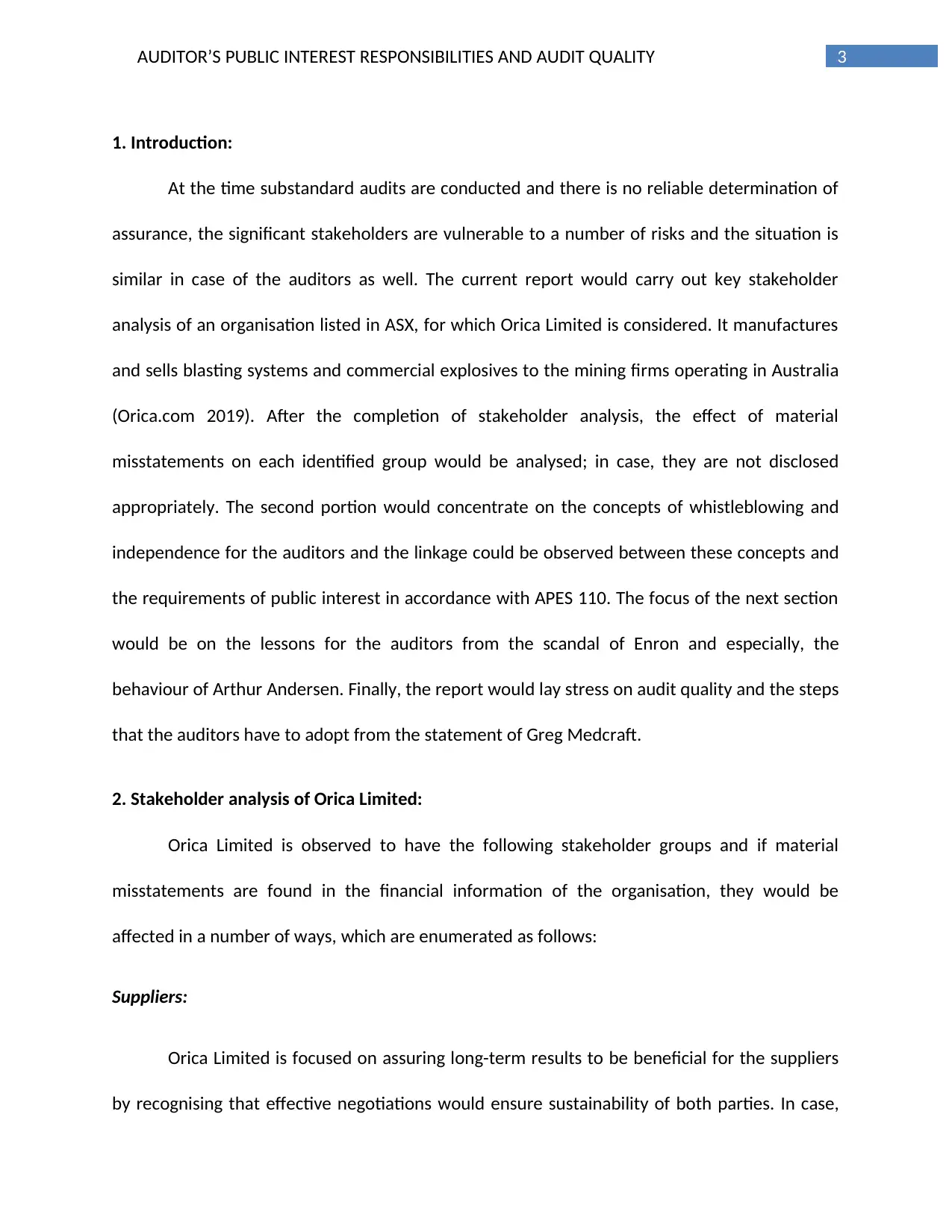
3AUDITOR’S PUBLIC INTEREST RESPONSIBILITIES AND AUDIT QUALITY
1. Introduction:
At the time substandard audits are conducted and there is no reliable determination of
assurance, the significant stakeholders are vulnerable to a number of risks and the situation is
similar in case of the auditors as well. The current report would carry out key stakeholder
analysis of an organisation listed in ASX, for which Orica Limited is considered. It manufactures
and sells blasting systems and commercial explosives to the mining firms operating in Australia
(Orica.com 2019). After the completion of stakeholder analysis, the effect of material
misstatements on each identified group would be analysed; in case, they are not disclosed
appropriately. The second portion would concentrate on the concepts of whistleblowing and
independence for the auditors and the linkage could be observed between these concepts and
the requirements of public interest in accordance with APES 110. The focus of the next section
would be on the lessons for the auditors from the scandal of Enron and especially, the
behaviour of Arthur Andersen. Finally, the report would lay stress on audit quality and the steps
that the auditors have to adopt from the statement of Greg Medcraft.
2. Stakeholder analysis of Orica Limited:
Orica Limited is observed to have the following stakeholder groups and if material
misstatements are found in the financial information of the organisation, they would be
affected in a number of ways, which are enumerated as follows:
Suppliers:
Orica Limited is focused on assuring long-term results to be beneficial for the suppliers
by recognising that effective negotiations would ensure sustainability of both parties. In case,
1. Introduction:
At the time substandard audits are conducted and there is no reliable determination of
assurance, the significant stakeholders are vulnerable to a number of risks and the situation is
similar in case of the auditors as well. The current report would carry out key stakeholder
analysis of an organisation listed in ASX, for which Orica Limited is considered. It manufactures
and sells blasting systems and commercial explosives to the mining firms operating in Australia
(Orica.com 2019). After the completion of stakeholder analysis, the effect of material
misstatements on each identified group would be analysed; in case, they are not disclosed
appropriately. The second portion would concentrate on the concepts of whistleblowing and
independence for the auditors and the linkage could be observed between these concepts and
the requirements of public interest in accordance with APES 110. The focus of the next section
would be on the lessons for the auditors from the scandal of Enron and especially, the
behaviour of Arthur Andersen. Finally, the report would lay stress on audit quality and the steps
that the auditors have to adopt from the statement of Greg Medcraft.
2. Stakeholder analysis of Orica Limited:
Orica Limited is observed to have the following stakeholder groups and if material
misstatements are found in the financial information of the organisation, they would be
affected in a number of ways, which are enumerated as follows:
Suppliers:
Orica Limited is focused on assuring long-term results to be beneficial for the suppliers
by recognising that effective negotiations would ensure sustainability of both parties. In case,
Paraphrase This Document
Need a fresh take? Get an instant paraphrase of this document with our AI Paraphraser
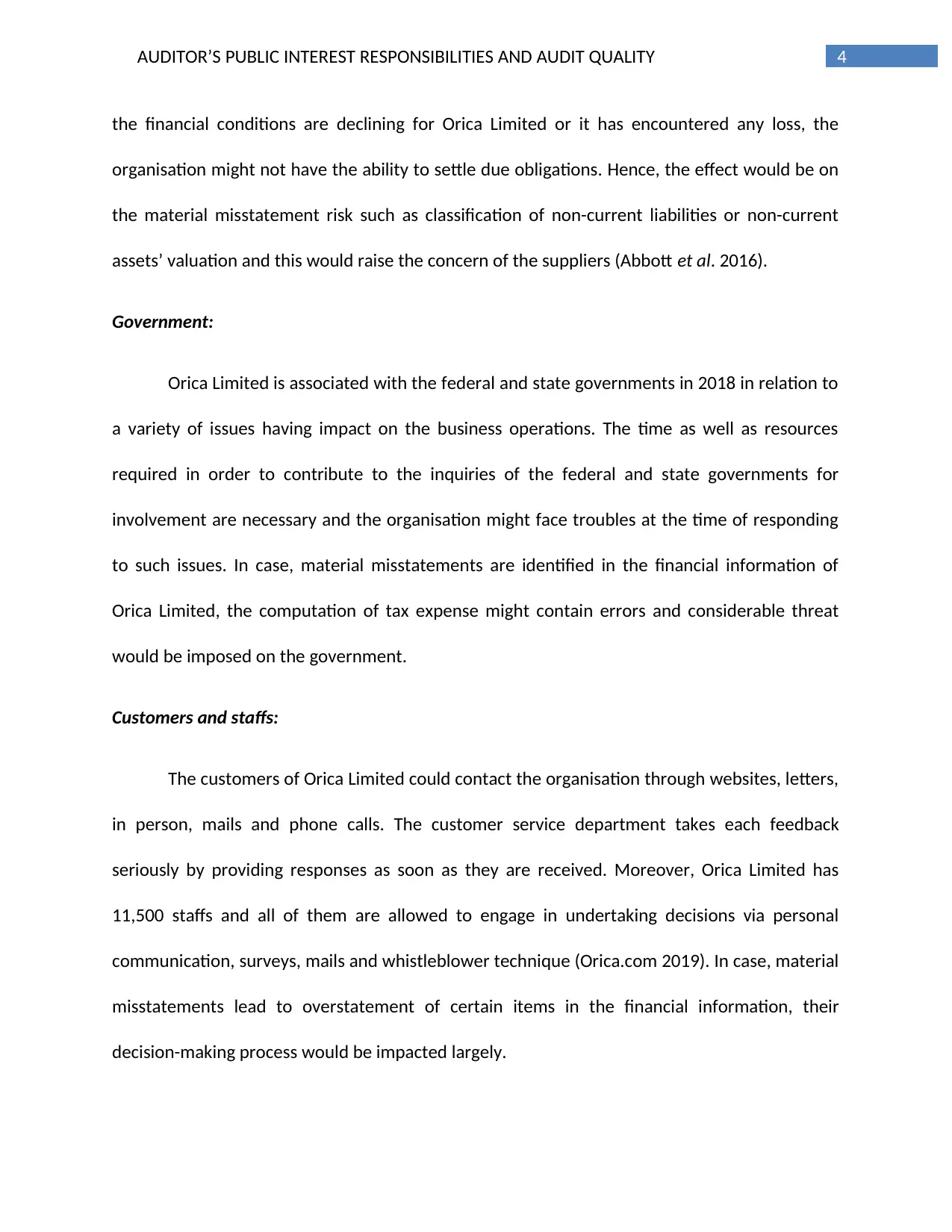
4AUDITOR’S PUBLIC INTEREST RESPONSIBILITIES AND AUDIT QUALITY
the financial conditions are declining for Orica Limited or it has encountered any loss, the
organisation might not have the ability to settle due obligations. Hence, the effect would be on
the material misstatement risk such as classification of non-current liabilities or non-current
assets’ valuation and this would raise the concern of the suppliers (Abbott et al. 2016).
Government:
Orica Limited is associated with the federal and state governments in 2018 in relation to
a variety of issues having impact on the business operations. The time as well as resources
required in order to contribute to the inquiries of the federal and state governments for
involvement are necessary and the organisation might face troubles at the time of responding
to such issues. In case, material misstatements are identified in the financial information of
Orica Limited, the computation of tax expense might contain errors and considerable threat
would be imposed on the government.
Customers and staffs:
The customers of Orica Limited could contact the organisation through websites, letters,
in person, mails and phone calls. The customer service department takes each feedback
seriously by providing responses as soon as they are received. Moreover, Orica Limited has
11,500 staffs and all of them are allowed to engage in undertaking decisions via personal
communication, surveys, mails and whistleblower technique (Orica.com 2019). In case, material
misstatements lead to overstatement of certain items in the financial information, their
decision-making process would be impacted largely.
the financial conditions are declining for Orica Limited or it has encountered any loss, the
organisation might not have the ability to settle due obligations. Hence, the effect would be on
the material misstatement risk such as classification of non-current liabilities or non-current
assets’ valuation and this would raise the concern of the suppliers (Abbott et al. 2016).
Government:
Orica Limited is associated with the federal and state governments in 2018 in relation to
a variety of issues having impact on the business operations. The time as well as resources
required in order to contribute to the inquiries of the federal and state governments for
involvement are necessary and the organisation might face troubles at the time of responding
to such issues. In case, material misstatements are identified in the financial information of
Orica Limited, the computation of tax expense might contain errors and considerable threat
would be imposed on the government.
Customers and staffs:
The customers of Orica Limited could contact the organisation through websites, letters,
in person, mails and phone calls. The customer service department takes each feedback
seriously by providing responses as soon as they are received. Moreover, Orica Limited has
11,500 staffs and all of them are allowed to engage in undertaking decisions via personal
communication, surveys, mails and whistleblower technique (Orica.com 2019). In case, material
misstatements lead to overstatement of certain items in the financial information, their
decision-making process would be impacted largely.
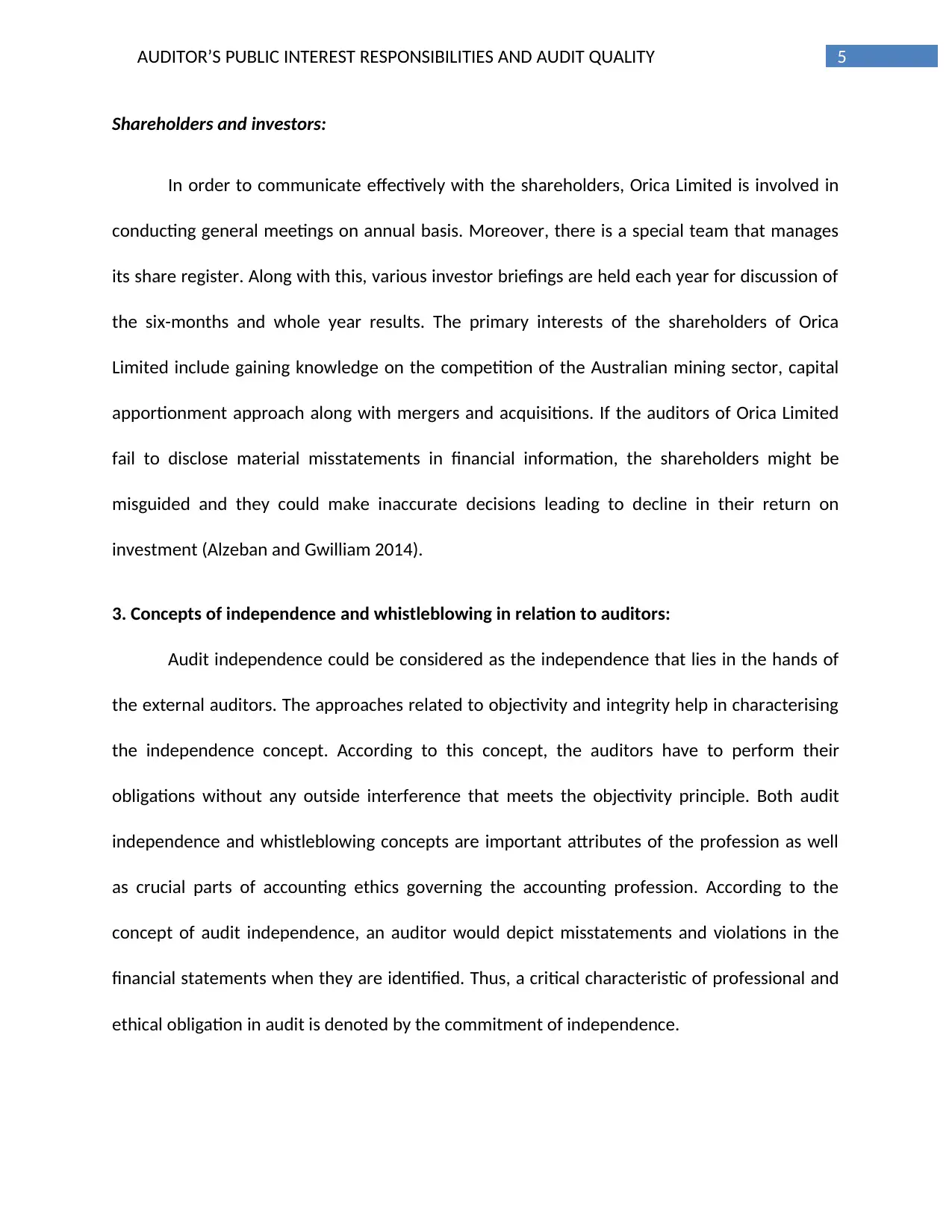
5AUDITOR’S PUBLIC INTEREST RESPONSIBILITIES AND AUDIT QUALITY
Shareholders and investors:
In order to communicate effectively with the shareholders, Orica Limited is involved in
conducting general meetings on annual basis. Moreover, there is a special team that manages
its share register. Along with this, various investor briefings are held each year for discussion of
the six-months and whole year results. The primary interests of the shareholders of Orica
Limited include gaining knowledge on the competition of the Australian mining sector, capital
apportionment approach along with mergers and acquisitions. If the auditors of Orica Limited
fail to disclose material misstatements in financial information, the shareholders might be
misguided and they could make inaccurate decisions leading to decline in their return on
investment (Alzeban and Gwilliam 2014).
3. Concepts of independence and whistleblowing in relation to auditors:
Audit independence could be considered as the independence that lies in the hands of
the external auditors. The approaches related to objectivity and integrity help in characterising
the independence concept. According to this concept, the auditors have to perform their
obligations without any outside interference that meets the objectivity principle. Both audit
independence and whistleblowing concepts are important attributes of the profession as well
as crucial parts of accounting ethics governing the accounting profession. According to the
concept of audit independence, an auditor would depict misstatements and violations in the
financial statements when they are identified. Thus, a critical characteristic of professional and
ethical obligation in audit is denoted by the commitment of independence.
Shareholders and investors:
In order to communicate effectively with the shareholders, Orica Limited is involved in
conducting general meetings on annual basis. Moreover, there is a special team that manages
its share register. Along with this, various investor briefings are held each year for discussion of
the six-months and whole year results. The primary interests of the shareholders of Orica
Limited include gaining knowledge on the competition of the Australian mining sector, capital
apportionment approach along with mergers and acquisitions. If the auditors of Orica Limited
fail to disclose material misstatements in financial information, the shareholders might be
misguided and they could make inaccurate decisions leading to decline in their return on
investment (Alzeban and Gwilliam 2014).
3. Concepts of independence and whistleblowing in relation to auditors:
Audit independence could be considered as the independence that lies in the hands of
the external auditors. The approaches related to objectivity and integrity help in characterising
the independence concept. According to this concept, the auditors have to perform their
obligations without any outside interference that meets the objectivity principle. Both audit
independence and whistleblowing concepts are important attributes of the profession as well
as crucial parts of accounting ethics governing the accounting profession. According to the
concept of audit independence, an auditor would depict misstatements and violations in the
financial statements when they are identified. Thus, a critical characteristic of professional and
ethical obligation in audit is denoted by the commitment of independence.
⊘ This is a preview!⊘
Do you want full access?
Subscribe today to unlock all pages.

Trusted by 1+ million students worldwide
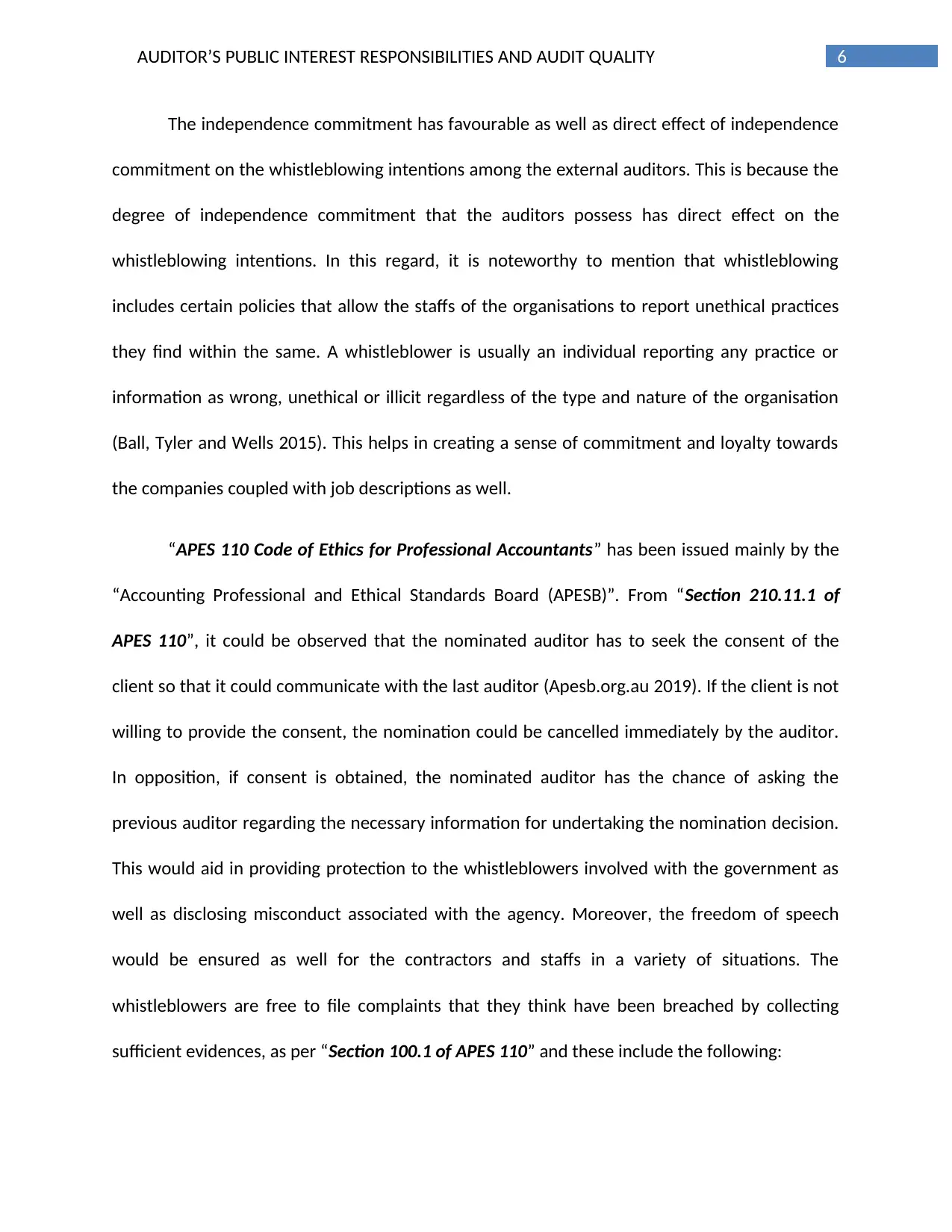
6AUDITOR’S PUBLIC INTEREST RESPONSIBILITIES AND AUDIT QUALITY
The independence commitment has favourable as well as direct effect of independence
commitment on the whistleblowing intentions among the external auditors. This is because the
degree of independence commitment that the auditors possess has direct effect on the
whistleblowing intentions. In this regard, it is noteworthy to mention that whistleblowing
includes certain policies that allow the staffs of the organisations to report unethical practices
they find within the same. A whistleblower is usually an individual reporting any practice or
information as wrong, unethical or illicit regardless of the type and nature of the organisation
(Ball, Tyler and Wells 2015). This helps in creating a sense of commitment and loyalty towards
the companies coupled with job descriptions as well.
“APES 110 Code of Ethics for Professional Accountants” has been issued mainly by the
“Accounting Professional and Ethical Standards Board (APESB)”. From “Section 210.11.1 of
APES 110”, it could be observed that the nominated auditor has to seek the consent of the
client so that it could communicate with the last auditor (Apesb.org.au 2019). If the client is not
willing to provide the consent, the nomination could be cancelled immediately by the auditor.
In opposition, if consent is obtained, the nominated auditor has the chance of asking the
previous auditor regarding the necessary information for undertaking the nomination decision.
This would aid in providing protection to the whistleblowers involved with the government as
well as disclosing misconduct associated with the agency. Moreover, the freedom of speech
would be ensured as well for the contractors and staffs in a variety of situations. The
whistleblowers are free to file complaints that they think have been breached by collecting
sufficient evidences, as per “Section 100.1 of APES 110” and these include the following:
The independence commitment has favourable as well as direct effect of independence
commitment on the whistleblowing intentions among the external auditors. This is because the
degree of independence commitment that the auditors possess has direct effect on the
whistleblowing intentions. In this regard, it is noteworthy to mention that whistleblowing
includes certain policies that allow the staffs of the organisations to report unethical practices
they find within the same. A whistleblower is usually an individual reporting any practice or
information as wrong, unethical or illicit regardless of the type and nature of the organisation
(Ball, Tyler and Wells 2015). This helps in creating a sense of commitment and loyalty towards
the companies coupled with job descriptions as well.
“APES 110 Code of Ethics for Professional Accountants” has been issued mainly by the
“Accounting Professional and Ethical Standards Board (APESB)”. From “Section 210.11.1 of
APES 110”, it could be observed that the nominated auditor has to seek the consent of the
client so that it could communicate with the last auditor (Apesb.org.au 2019). If the client is not
willing to provide the consent, the nomination could be cancelled immediately by the auditor.
In opposition, if consent is obtained, the nominated auditor has the chance of asking the
previous auditor regarding the necessary information for undertaking the nomination decision.
This would aid in providing protection to the whistleblowers involved with the government as
well as disclosing misconduct associated with the agency. Moreover, the freedom of speech
would be ensured as well for the contractors and staffs in a variety of situations. The
whistleblowers are free to file complaints that they think have been breached by collecting
sufficient evidences, as per “Section 100.1 of APES 110” and these include the following:
Paraphrase This Document
Need a fresh take? Get an instant paraphrase of this document with our AI Paraphraser
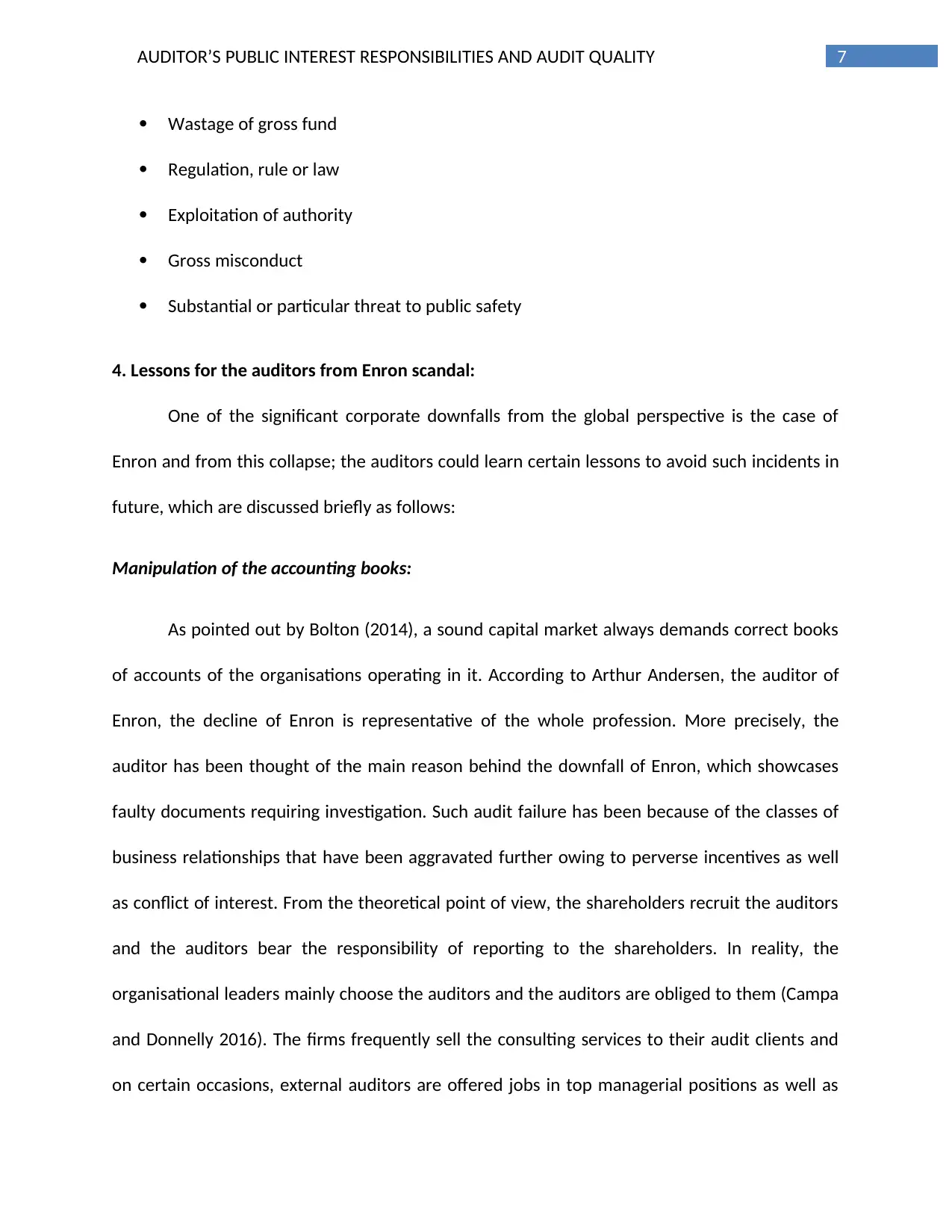
7AUDITOR’S PUBLIC INTEREST RESPONSIBILITIES AND AUDIT QUALITY
Wastage of gross fund
Regulation, rule or law
Exploitation of authority
Gross misconduct
Substantial or particular threat to public safety
4. Lessons for the auditors from Enron scandal:
One of the significant corporate downfalls from the global perspective is the case of
Enron and from this collapse; the auditors could learn certain lessons to avoid such incidents in
future, which are discussed briefly as follows:
Manipulation of the accounting books:
As pointed out by Bolton (2014), a sound capital market always demands correct books
of accounts of the organisations operating in it. According to Arthur Andersen, the auditor of
Enron, the decline of Enron is representative of the whole profession. More precisely, the
auditor has been thought of the main reason behind the downfall of Enron, which showcases
faulty documents requiring investigation. Such audit failure has been because of the classes of
business relationships that have been aggravated further owing to perverse incentives as well
as conflict of interest. From the theoretical point of view, the shareholders recruit the auditors
and the auditors bear the responsibility of reporting to the shareholders. In reality, the
organisational leaders mainly choose the auditors and the auditors are obliged to them (Campa
and Donnelly 2016). The firms frequently sell the consulting services to their audit clients and
on certain occasions, external auditors are offered jobs in top managerial positions as well as
Wastage of gross fund
Regulation, rule or law
Exploitation of authority
Gross misconduct
Substantial or particular threat to public safety
4. Lessons for the auditors from Enron scandal:
One of the significant corporate downfalls from the global perspective is the case of
Enron and from this collapse; the auditors could learn certain lessons to avoid such incidents in
future, which are discussed briefly as follows:
Manipulation of the accounting books:
As pointed out by Bolton (2014), a sound capital market always demands correct books
of accounts of the organisations operating in it. According to Arthur Andersen, the auditor of
Enron, the decline of Enron is representative of the whole profession. More precisely, the
auditor has been thought of the main reason behind the downfall of Enron, which showcases
faulty documents requiring investigation. Such audit failure has been because of the classes of
business relationships that have been aggravated further owing to perverse incentives as well
as conflict of interest. From the theoretical point of view, the shareholders recruit the auditors
and the auditors bear the responsibility of reporting to the shareholders. In reality, the
organisational leaders mainly choose the auditors and the auditors are obliged to them (Campa
and Donnelly 2016). The firms frequently sell the consulting services to their audit clients and
on certain occasions, external auditors are offered jobs in top managerial positions as well as
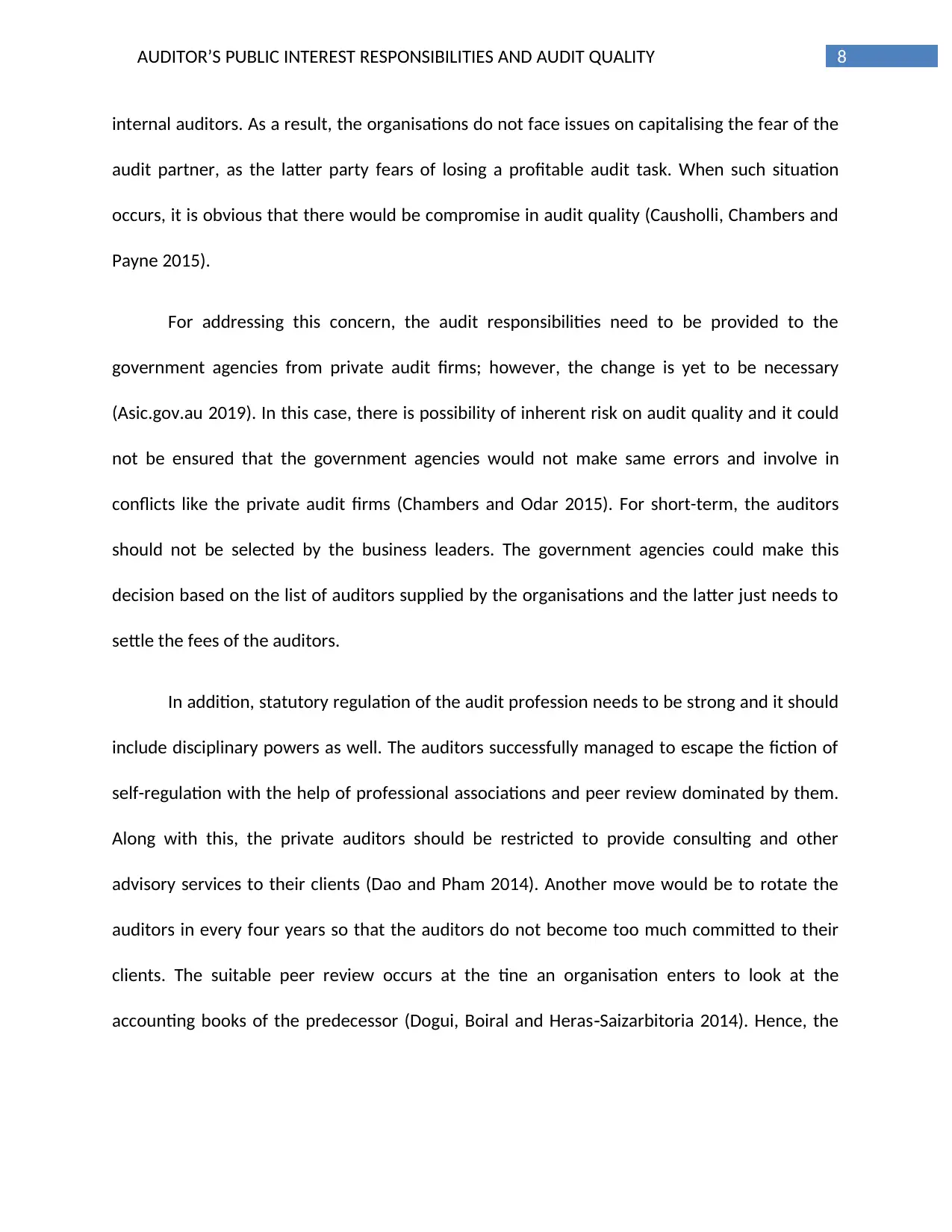
8AUDITOR’S PUBLIC INTEREST RESPONSIBILITIES AND AUDIT QUALITY
internal auditors. As a result, the organisations do not face issues on capitalising the fear of the
audit partner, as the latter party fears of losing a profitable audit task. When such situation
occurs, it is obvious that there would be compromise in audit quality (Causholli, Chambers and
Payne 2015).
For addressing this concern, the audit responsibilities need to be provided to the
government agencies from private audit firms; however, the change is yet to be necessary
(Asic.gov.au 2019). In this case, there is possibility of inherent risk on audit quality and it could
not be ensured that the government agencies would not make same errors and involve in
conflicts like the private audit firms (Chambers and Odar 2015). For short-term, the auditors
should not be selected by the business leaders. The government agencies could make this
decision based on the list of auditors supplied by the organisations and the latter just needs to
settle the fees of the auditors.
In addition, statutory regulation of the audit profession needs to be strong and it should
include disciplinary powers as well. The auditors successfully managed to escape the fiction of
self-regulation with the help of professional associations and peer review dominated by them.
Along with this, the private auditors should be restricted to provide consulting and other
advisory services to their clients (Dao and Pham 2014). Another move would be to rotate the
auditors in every four years so that the auditors do not become too much committed to their
clients. The suitable peer review occurs at the tine an organisation enters to look at the
accounting books of the predecessor (Dogui, Boiral and Heras Saizarbitoria 2014). Hence, the‐
internal auditors. As a result, the organisations do not face issues on capitalising the fear of the
audit partner, as the latter party fears of losing a profitable audit task. When such situation
occurs, it is obvious that there would be compromise in audit quality (Causholli, Chambers and
Payne 2015).
For addressing this concern, the audit responsibilities need to be provided to the
government agencies from private audit firms; however, the change is yet to be necessary
(Asic.gov.au 2019). In this case, there is possibility of inherent risk on audit quality and it could
not be ensured that the government agencies would not make same errors and involve in
conflicts like the private audit firms (Chambers and Odar 2015). For short-term, the auditors
should not be selected by the business leaders. The government agencies could make this
decision based on the list of auditors supplied by the organisations and the latter just needs to
settle the fees of the auditors.
In addition, statutory regulation of the audit profession needs to be strong and it should
include disciplinary powers as well. The auditors successfully managed to escape the fiction of
self-regulation with the help of professional associations and peer review dominated by them.
Along with this, the private auditors should be restricted to provide consulting and other
advisory services to their clients (Dao and Pham 2014). Another move would be to rotate the
auditors in every four years so that the auditors do not become too much committed to their
clients. The suitable peer review occurs at the tine an organisation enters to look at the
accounting books of the predecessor (Dogui, Boiral and Heras Saizarbitoria 2014). Hence, the‐
⊘ This is a preview!⊘
Do you want full access?
Subscribe today to unlock all pages.

Trusted by 1+ million students worldwide
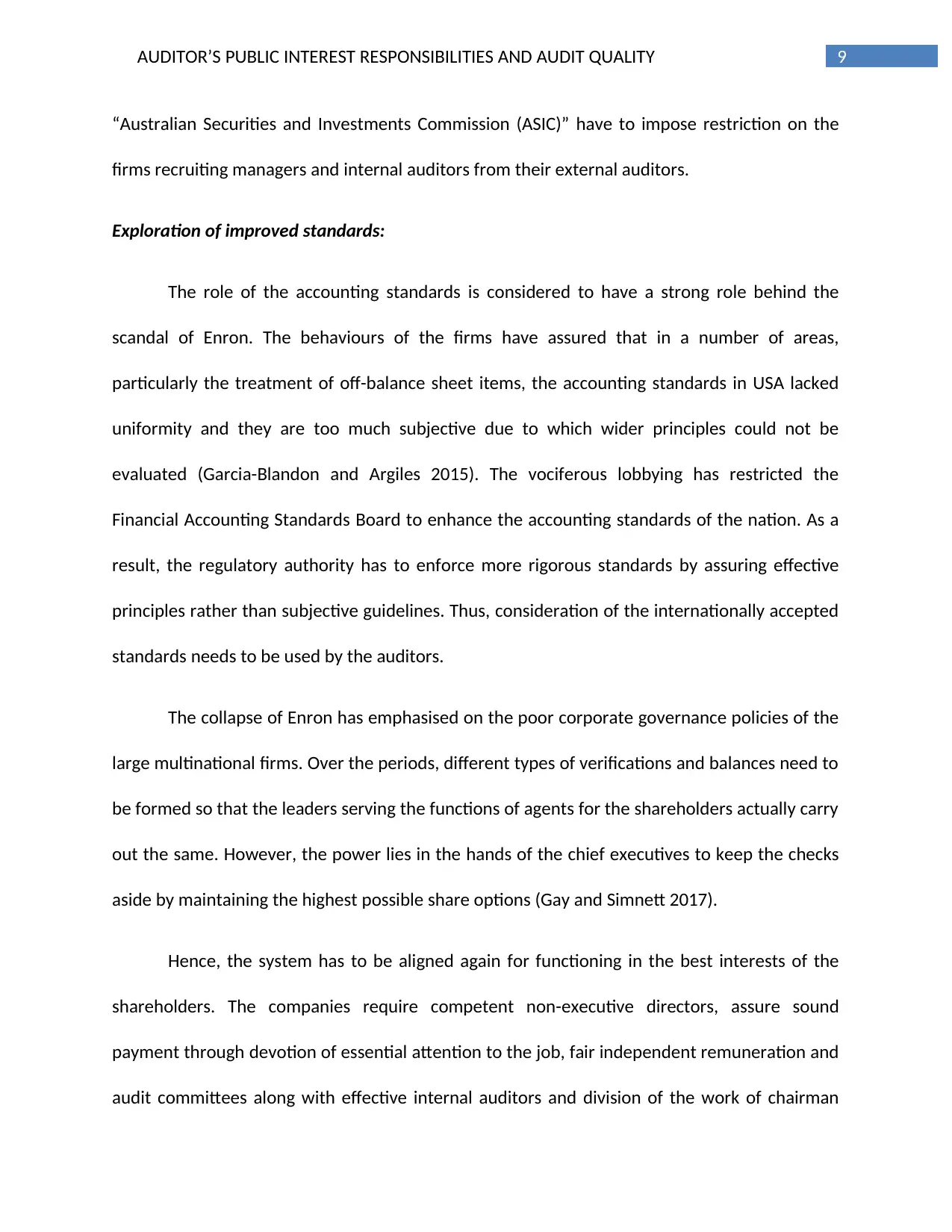
9AUDITOR’S PUBLIC INTEREST RESPONSIBILITIES AND AUDIT QUALITY
“Australian Securities and Investments Commission (ASIC)” have to impose restriction on the
firms recruiting managers and internal auditors from their external auditors.
Exploration of improved standards:
The role of the accounting standards is considered to have a strong role behind the
scandal of Enron. The behaviours of the firms have assured that in a number of areas,
particularly the treatment of off-balance sheet items, the accounting standards in USA lacked
uniformity and they are too much subjective due to which wider principles could not be
evaluated (Garcia-Blandon and Argiles 2015). The vociferous lobbying has restricted the
Financial Accounting Standards Board to enhance the accounting standards of the nation. As a
result, the regulatory authority has to enforce more rigorous standards by assuring effective
principles rather than subjective guidelines. Thus, consideration of the internationally accepted
standards needs to be used by the auditors.
The collapse of Enron has emphasised on the poor corporate governance policies of the
large multinational firms. Over the periods, different types of verifications and balances need to
be formed so that the leaders serving the functions of agents for the shareholders actually carry
out the same. However, the power lies in the hands of the chief executives to keep the checks
aside by maintaining the highest possible share options (Gay and Simnett 2017).
Hence, the system has to be aligned again for functioning in the best interests of the
shareholders. The companies require competent non-executive directors, assure sound
payment through devotion of essential attention to the job, fair independent remuneration and
audit committees along with effective internal auditors and division of the work of chairman
“Australian Securities and Investments Commission (ASIC)” have to impose restriction on the
firms recruiting managers and internal auditors from their external auditors.
Exploration of improved standards:
The role of the accounting standards is considered to have a strong role behind the
scandal of Enron. The behaviours of the firms have assured that in a number of areas,
particularly the treatment of off-balance sheet items, the accounting standards in USA lacked
uniformity and they are too much subjective due to which wider principles could not be
evaluated (Garcia-Blandon and Argiles 2015). The vociferous lobbying has restricted the
Financial Accounting Standards Board to enhance the accounting standards of the nation. As a
result, the regulatory authority has to enforce more rigorous standards by assuring effective
principles rather than subjective guidelines. Thus, consideration of the internationally accepted
standards needs to be used by the auditors.
The collapse of Enron has emphasised on the poor corporate governance policies of the
large multinational firms. Over the periods, different types of verifications and balances need to
be formed so that the leaders serving the functions of agents for the shareholders actually carry
out the same. However, the power lies in the hands of the chief executives to keep the checks
aside by maintaining the highest possible share options (Gay and Simnett 2017).
Hence, the system has to be aligned again for functioning in the best interests of the
shareholders. The companies require competent non-executive directors, assure sound
payment through devotion of essential attention to the job, fair independent remuneration and
audit committees along with effective internal auditors and division of the work of chairman
Paraphrase This Document
Need a fresh take? Get an instant paraphrase of this document with our AI Paraphraser
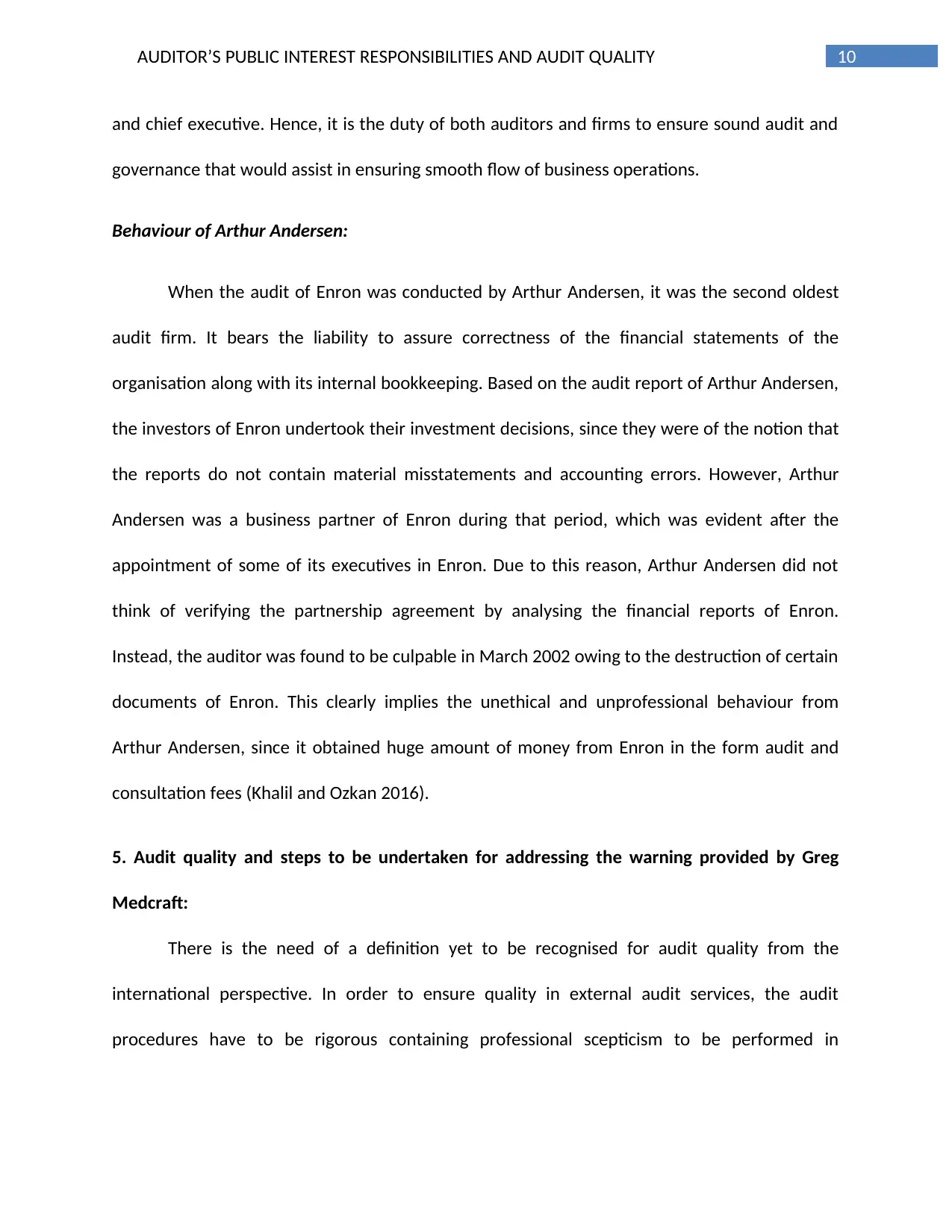
10AUDITOR’S PUBLIC INTEREST RESPONSIBILITIES AND AUDIT QUALITY
and chief executive. Hence, it is the duty of both auditors and firms to ensure sound audit and
governance that would assist in ensuring smooth flow of business operations.
Behaviour of Arthur Andersen:
When the audit of Enron was conducted by Arthur Andersen, it was the second oldest
audit firm. It bears the liability to assure correctness of the financial statements of the
organisation along with its internal bookkeeping. Based on the audit report of Arthur Andersen,
the investors of Enron undertook their investment decisions, since they were of the notion that
the reports do not contain material misstatements and accounting errors. However, Arthur
Andersen was a business partner of Enron during that period, which was evident after the
appointment of some of its executives in Enron. Due to this reason, Arthur Andersen did not
think of verifying the partnership agreement by analysing the financial reports of Enron.
Instead, the auditor was found to be culpable in March 2002 owing to the destruction of certain
documents of Enron. This clearly implies the unethical and unprofessional behaviour from
Arthur Andersen, since it obtained huge amount of money from Enron in the form audit and
consultation fees (Khalil and Ozkan 2016).
5. Audit quality and steps to be undertaken for addressing the warning provided by Greg
Medcraft:
There is the need of a definition yet to be recognised for audit quality from the
international perspective. In order to ensure quality in external audit services, the audit
procedures have to be rigorous containing professional scepticism to be performed in
and chief executive. Hence, it is the duty of both auditors and firms to ensure sound audit and
governance that would assist in ensuring smooth flow of business operations.
Behaviour of Arthur Andersen:
When the audit of Enron was conducted by Arthur Andersen, it was the second oldest
audit firm. It bears the liability to assure correctness of the financial statements of the
organisation along with its internal bookkeeping. Based on the audit report of Arthur Andersen,
the investors of Enron undertook their investment decisions, since they were of the notion that
the reports do not contain material misstatements and accounting errors. However, Arthur
Andersen was a business partner of Enron during that period, which was evident after the
appointment of some of its executives in Enron. Due to this reason, Arthur Andersen did not
think of verifying the partnership agreement by analysing the financial reports of Enron.
Instead, the auditor was found to be culpable in March 2002 owing to the destruction of certain
documents of Enron. This clearly implies the unethical and unprofessional behaviour from
Arthur Andersen, since it obtained huge amount of money from Enron in the form audit and
consultation fees (Khalil and Ozkan 2016).
5. Audit quality and steps to be undertaken for addressing the warning provided by Greg
Medcraft:
There is the need of a definition yet to be recognised for audit quality from the
international perspective. In order to ensure quality in external audit services, the audit
procedures have to be rigorous containing professional scepticism to be performed in
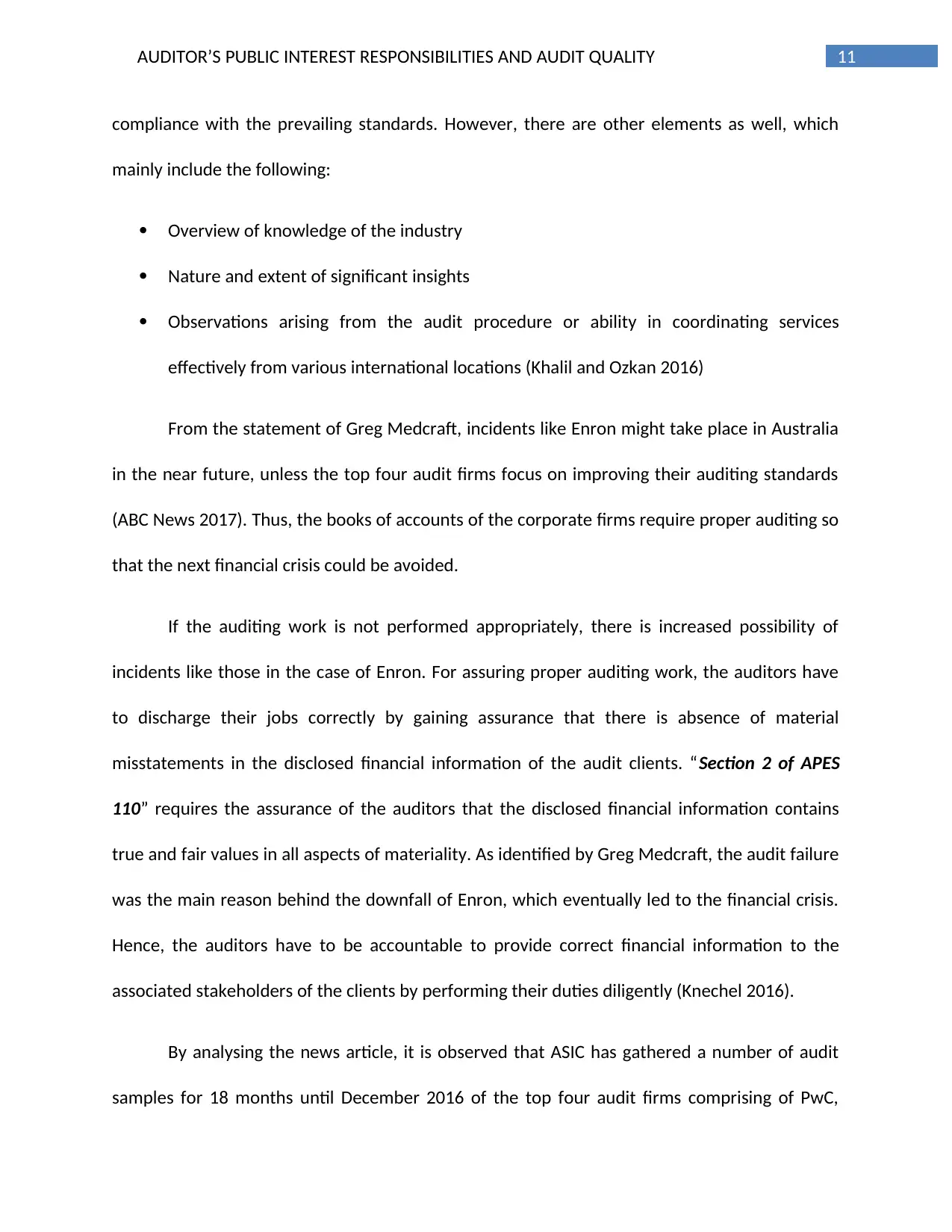
11AUDITOR’S PUBLIC INTEREST RESPONSIBILITIES AND AUDIT QUALITY
compliance with the prevailing standards. However, there are other elements as well, which
mainly include the following:
Overview of knowledge of the industry
Nature and extent of significant insights
Observations arising from the audit procedure or ability in coordinating services
effectively from various international locations (Khalil and Ozkan 2016)
From the statement of Greg Medcraft, incidents like Enron might take place in Australia
in the near future, unless the top four audit firms focus on improving their auditing standards
(ABC News 2017). Thus, the books of accounts of the corporate firms require proper auditing so
that the next financial crisis could be avoided.
If the auditing work is not performed appropriately, there is increased possibility of
incidents like those in the case of Enron. For assuring proper auditing work, the auditors have
to discharge their jobs correctly by gaining assurance that there is absence of material
misstatements in the disclosed financial information of the audit clients. “Section 2 of APES
110” requires the assurance of the auditors that the disclosed financial information contains
true and fair values in all aspects of materiality. As identified by Greg Medcraft, the audit failure
was the main reason behind the downfall of Enron, which eventually led to the financial crisis.
Hence, the auditors have to be accountable to provide correct financial information to the
associated stakeholders of the clients by performing their duties diligently (Knechel 2016).
By analysing the news article, it is observed that ASIC has gathered a number of audit
samples for 18 months until December 2016 of the top four audit firms comprising of PwC,
compliance with the prevailing standards. However, there are other elements as well, which
mainly include the following:
Overview of knowledge of the industry
Nature and extent of significant insights
Observations arising from the audit procedure or ability in coordinating services
effectively from various international locations (Khalil and Ozkan 2016)
From the statement of Greg Medcraft, incidents like Enron might take place in Australia
in the near future, unless the top four audit firms focus on improving their auditing standards
(ABC News 2017). Thus, the books of accounts of the corporate firms require proper auditing so
that the next financial crisis could be avoided.
If the auditing work is not performed appropriately, there is increased possibility of
incidents like those in the case of Enron. For assuring proper auditing work, the auditors have
to discharge their jobs correctly by gaining assurance that there is absence of material
misstatements in the disclosed financial information of the audit clients. “Section 2 of APES
110” requires the assurance of the auditors that the disclosed financial information contains
true and fair values in all aspects of materiality. As identified by Greg Medcraft, the audit failure
was the main reason behind the downfall of Enron, which eventually led to the financial crisis.
Hence, the auditors have to be accountable to provide correct financial information to the
associated stakeholders of the clients by performing their duties diligently (Knechel 2016).
By analysing the news article, it is observed that ASIC has gathered a number of audit
samples for 18 months until December 2016 of the top four audit firms comprising of PwC,
⊘ This is a preview!⊘
Do you want full access?
Subscribe today to unlock all pages.

Trusted by 1+ million students worldwide
1 out of 18
Related Documents
Your All-in-One AI-Powered Toolkit for Academic Success.
+13062052269
info@desklib.com
Available 24*7 on WhatsApp / Email
![[object Object]](/_next/static/media/star-bottom.7253800d.svg)
Unlock your academic potential
Copyright © 2020–2026 A2Z Services. All Rights Reserved. Developed and managed by ZUCOL.





